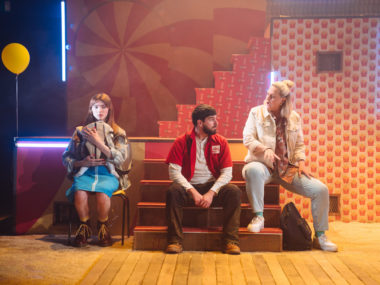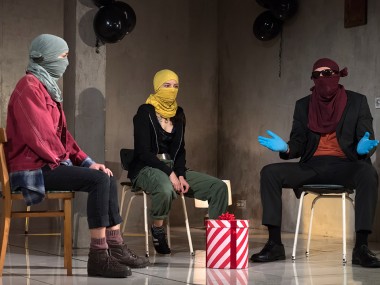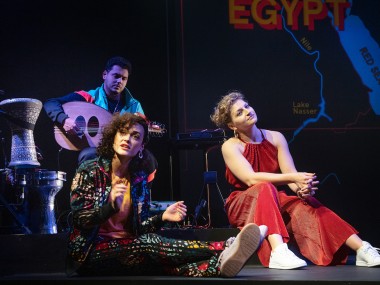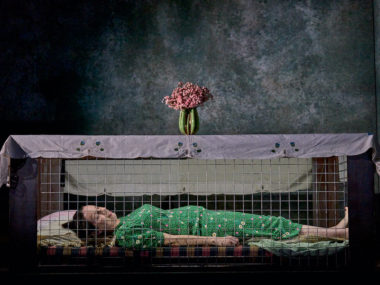Mates in Chelsea, Royal Court
Thursday 9th November 2023
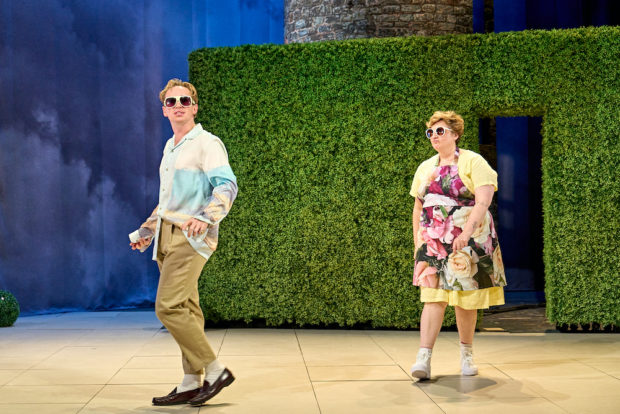
As Christmas looms, ’tis the season for comedy. And even the traditionally austere Royal Court feels obliged to join in. So here we go again with the same team — writer Rory Mullarkey and director Sam Pritchard — who brought the colourfully cartoonish Pity to this venue in 2018. Their latest, Mates in Chelsea, is billed as a comedy of manners inspired by Oscar Wilde and PJ Wodehouse, with a nod to reality TV show Made in Chelsea, and stars Laurie Kynaston and George Fouracres. But, in a society where reality is so much more satirical than fiction, can the team pull off a fun show that actually has something to say?
The story begins, in classic Wilde and Wodehouse style, with the aristocratic Theodore “Tug” Bungay (Kynaston) and his public school chum Charlton “Charlie” Thrupp (Fouracres) expecting the arrival of the former’s mother, Lady Agrippina. Waited on by Mrs Hanratty, the communist housekeeper, they joke and jest about Afghanistan and Tug’s problems with Finty Crossbell, his fiancée of seven years. When Agrippina arrives she bears bad tidings: the family is broke. Solution? Well, easy: sell — with a little help from Agrippa’s French financial adviser Simone Montesquieu — Dimly Grange, their Northumberland castle, to the Russian oligarch Oleg Mikhailovich Govorov.
Indeed, the second half of the show moves from London’s Sloane acres to Dimly Grange, as Tug conspires to scupper the sale of his childhood home, to which he has a passionately sentimental attachment. In this he is aided by both Mrs Hanratty and a shadowy cultural stylist, who changes his appearance into that of Oleg, enabling him to confront Agrippina and Simone, whose badminton partnership has become increasingly intimate. As the comedy gathers farcical speed, Finty and Charlie also try to help out, while the real Oleg tries to avoid the attentions of Putin’s assassins.
Okay, there are some good jokes about upper-class entitlement, boarding school sex, Russian influence in British society, the heritage of Lenin in communist circles, English identity and privilege in general. At times, fans of Fouracres can be guaranteed to scream with laughter. But this kind of manistream jollity feels out of place on the Royal Court stage: where is the cutting-edge satire? Where is danger? Where is anger? Answer: nowhere. A funny joke about the Tory party being leftwing is amusing, until you ask what exactly does it illuminate about the cruel idiots currently in power? Answer: nothing.
As the plotting gets increasingly messy, its muddle licensed by the surreal but inconsequential playfulness of the writing, the big theme of toffs being immune to the consequences of their stupidities while giving a social leg up to Russian kleptocrats gets lost, buried by the show’s innate silliness. There’s a rare instance of a slightly dangerous joke about the Evening Standard theatre awards, sponsored by a newspaper owned by Evgeny Lebedev, now Baron Lebedev, and a mildly satirical reference to Peter Morgan’s Patriots, but not much more. The Wilde and Wodehouse references, from Finty’s parody of Lady Bracknell’s interrogation to Mrs Hanratty’s imitation of Jeeves’s indispensability, are Poundland pastiche.
A lot of the humour depends on the funny foreigner stereotypes — a variety of heavy accents — beloved of British playwrights, and this tends to undercut Mullarkey’s serious points about how the childish and impoverished British aristos are fair game for worldly and loaded Russian tycoons. Both are, indeed, mates in SW3 and SW10. Metaphorically, it’s all about William the Conqueror coming to life again in Londongrad, with a bit of revivified Vladimir Ilyich Ulyanov thrown in for good measure. But funny as some of the jokes are, the play itself outstays its welcome by a good 20 minutes, with the final section grinding tediously to its end.
Pritchard’s production, colourfully designed by Milla Clarke with a couple of visual jokes such as the castle cake, is overwrought and overdone, despite some good work by the actors. Kynaston’s Tug spends much of the evening whining, but also manages a few flashes of anger and pain, while the real star of the show is Fenella Woolgar as Agrippina, cool, calm and collecting moments of emotional depth. By contrast, Fouracres is all funny voices, with random accents thrown in, and exaggerated gestures. Much better is Amy Booth-Steel’s vigorous Mrs Hanratty, while Natalie Dew and Karina Fernandez enjoy themselves as Finty and Simone. Since laughter is apparently the best medicine, perhaps Mates in Chelsea should be available on prescription for anyone who can claim descent from either the Normans or the Romanovs. But, as artistic director Vicky Featherstone’s farewell to the Court, this is a disappointment.
This review first appeared on The Arts Desk

